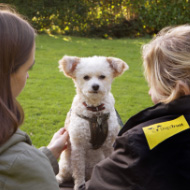New guidance recognises link between domestic abuse and pets

Nine in ten professionals working in the domestic abuse sector are aware of cases where pets have also been abused.
Welfare charity Dogs Trust has welcomed new guidance that recognises the link between abuse towards pets and domestic abuse.
The organisation, which has long campaigned for a change in the law, hailed the move as a “great step forwards” that will “increase the recognition of the connection between pets and domestic abuse”.
Released on Friday (4 July), the new guidance has been produced alongside the Domestic Abuse Act, formally recognising certain types of behaviour towards pets as an example of domestic abuse and underlining how pets can be used as a tool by perpetrators.
Under the 'Recognising domestic abuse' section, the new guidance highlights different examples of abusive behaviour, including:
‘Using animals to control or coerce a victim, e.g. harming or threatening to harm, or give away, pets or assistance dogs’, has been included as an example of behaviours which might be considered controlling or coercive.'
‘Using violence or threats towards assistance dogs and pets to intimidate the victim and cause distress, including threatening to harm the animal as well as controlling how the owner is able to care for the animal’ has been included as an example of emotional or psychological abuse.'
Under the examples of technology-facilitated abuse, the guidance also includes the use of spyware or GPS trackers on pets.
Dogs Trust has long been calling for these behaviours to be formally recognised as abusive within the Domestic Abuse Act to better protect domestic abuse victims and their pets. Through its Freedom Project - a specialist pet fostering service for survivors of domestic abuse – the charity sees first-hand how dogs can be used by perpetrators to coerce and control their partners
Research by the charity found that around nine in ten professionals working in the domestic abuse sector are aware of cases where pets have also been abused. Furthermore, in addition to the physical abuse, 97 per cent of professionals believe pets are also often used to control someone experiencing domestic abuse.
Welcoming the new guidance, Amy Hyde, deputy head of outreach projects at Dogs Trust, said: “We are delighted that behaviours such as threatening or harming pets, as well as threatening to give them away, have been recognised in the Domestic Abuse Act guidance as potential examples of abusive behaviour.
“Through our Freedom Project, we regularly see the different ways in which the bond that a survivor has with their pet is exploited by perpetrators of domestic abuse. This sort of behaviour can range from perpetrators stopping the survivor from accessing vet care for their dogs or spending money on dog food, through to repeatedly threatening to harm, kill or ‘get rid’ of their dog.
She added: “We see the harm that abuse towards pets causes both the animals and the survivors every day through our work. Having to watch your pet suffer and live in fear is incredibly traumatic for many pet owners, and sadly it is a powerful tool that perpetrators will often use. This guidance is a great step forward and will increase the recognition of the connection between pets and domestic abuse”.



 The Veterinary Medicines Directorate (VMD) is inviting applications from veterinary students to attend a one-week extramural studies (EMS) placement in July 2026.
The Veterinary Medicines Directorate (VMD) is inviting applications from veterinary students to attend a one-week extramural studies (EMS) placement in July 2026.